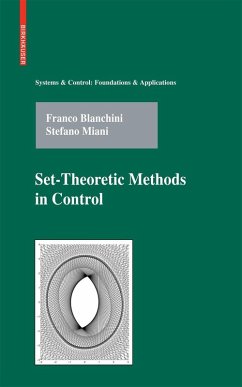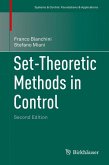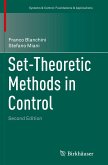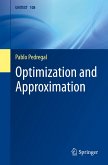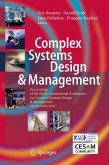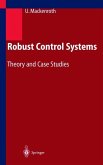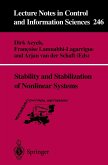This self-contained monograph describes basic set-theoretic methods for control. It provides a discussion of their links to fundamental problems in Lyapunov stability analysis and stabilization, optimal control, control under constraints, persistent disturbance rejection, and uncertain systems analysis and synthesis. The work presents several established and potentially new applications, along with numerical examples and case studies. A key theme is the trade-off between exact (but computationally intensive) and approximate (but conservative) solutions to problems. Mathematical language is kept to the minimum necessary.
Many control problems can be naturally formulated, analyzed, and solved in a set-theoretic context. Sets appear naturally when three aspects, which are crucial in control systems design, are considered: constraints, uncertainties, anddesignspeci?cations.Furthermore,setsarethemostappropriatelanguage to specify severalsystem performances, for instance when we areinterested in determining the domain of attraction, in measuring the e?ect of a persistent noise in a feedback loop or in bounding the error of an estimation algorithm. From a conceptual point of view, the peculiarity of the material presented in this book lies in the fact that sets are not only terms of the formulation, but they play an active role in the solution of the problems as well. Generally speaking, in the control theory context, all the techniques which are theore- cally based on some properties of subsets of the state-space could be referred to as set-theoretic methods. The most popular and clear link is that with Lyapunov theory and positive invariance. Lyapunov functions are positi- de?nite energy-type functions of the state variables, which have the property of being decreasing in time and are fundamental tools to guarantee stability. Besides, their sublevel sets are positively invariant and thus their shape is quite meaningful to characterize the system dynamics, a key point which will be enlightened in the present book. The invariance property will be shown to be fundamental in dealing with problems such as saturating control, noise suppression, model-predictive control, and many others.
Many control problems can be naturally formulated, analyzed, and solved in a set-theoretic context. Sets appear naturally when three aspects, which are crucial in control systems design, are considered: constraints, uncertainties, anddesignspeci?cations.Furthermore,setsarethemostappropriatelanguage to specify severalsystem performances, for instance when we areinterested in determining the domain of attraction, in measuring the e?ect of a persistent noise in a feedback loop or in bounding the error of an estimation algorithm. From a conceptual point of view, the peculiarity of the material presented in this book lies in the fact that sets are not only terms of the formulation, but they play an active role in the solution of the problems as well. Generally speaking, in the control theory context, all the techniques which are theore- cally based on some properties of subsets of the state-space could be referred to as set-theoretic methods. The most popular and clear link is that with Lyapunov theory and positive invariance. Lyapunov functions are positi- de?nite energy-type functions of the state variables, which have the property of being decreasing in time and are fundamental tools to guarantee stability. Besides, their sublevel sets are positively invariant and thus their shape is quite meaningful to characterize the system dynamics, a key point which will be enlightened in the present book. The invariance property will be shown to be fundamental in dealing with problems such as saturating control, noise suppression, model-predictive control, and many others.
From the reviews:
"The book is an outstanding monograph of a recent research trend in control. It reflects the vast experience of the authors as well as their noticeable contributions to the development of this field...At the conceptual level, the book was meant as a self contained volume for readers with the usual background in systems and control. The text is very accessible (the style is attractive; the theoretical concepts and results are accompanied by relevant examples so as to facilitate the deep understanding of the discussed topics; both analytical and numerical approaches are presented; the final section of each chapter includes exercises). The book is highly recommended to PhD students and researchers working in control engineering or applied mathematics. The material can also be used for graduate courses in these areas." [Octavian Pastravanu, Zentralblatt MATH]
"This is an excellent book, full of new ideas and collecting a lot of diverse material related to set-theoretic methods. It can be recommended to a wide control community audience." (B. T. Polyak, Mathematical Reviews, Issue 2009 f)
"The book is an outstanding monograph of a recent research trend in control. It reflects the vast experience of the authors as well as their noticeable contributions to the development of this field...At the conceptual level, the book was meant as a self contained volume for readers with the usual background in systems and control. The text is very accessible (the style is attractive; the theoretical concepts and results are accompanied by relevant examples so as to facilitate the deep understanding of the discussed topics; both analytical and numerical approaches are presented; the final section of each chapter includes exercises). The book is highly recommended to PhD students and researchers working in control engineering or applied mathematics. The material can also be used for graduate courses in these areas." [Octavian Pastravanu, Zentralblatt MATH]
"This is an excellent book, full of new ideas and collecting a lot of diverse material related to set-theoretic methods. It can be recommended to a wide control community audience." (B. T. Polyak, Mathematical Reviews, Issue 2009 f)
"This is an excellent book, full of new ideas and collecting a lot of diverse material related to set-theoretic methods. It can be recommended to a wide control community audience." -- B. T. Polyak, Mathematical Reviews
"This book is an outstanding monograph of a recent research trend in control. It reflects the vast experience of the authors as well as their noticeable contributions to the development of this field...[It] is highly recommended to PhD students and researchers working in control engineering or applied mathematics. The material can also be used for graduate courses in these areas." -- Octavian Pastravanu, Zentralblatt MATH
"This book is an outstanding monograph of a recent research trend in control. It reflects the vast experience of the authors as well as their noticeable contributions to the development of this field...[It] is highly recommended to PhD students and researchers working in control engineering or applied mathematics. The material can also be used for graduate courses in these areas." -- Octavian Pastravanu, Zentralblatt MATH

